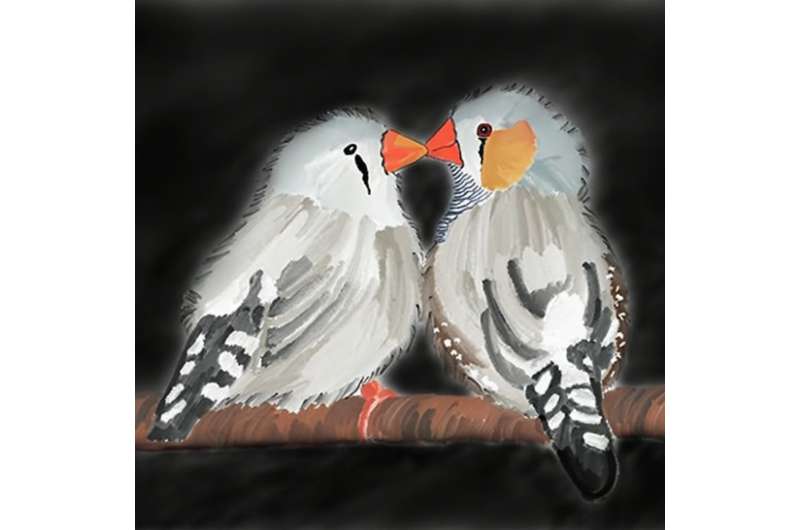This article has been reviewed according to Science X's editorial process and policies. Editors have highlighted the following attributes while ensuring the content's credibility:
fact-checked
peer-reviewed publication
trusted source
proofread
Dopamine-releasing brain cells reflect song bird intentions during courtship

His mind might have been set on finding water or on perfecting a song he learned as a chick from his dad. But all of that gets pushed down the to-do list for an adult male zebra finch when he notices a female has drawn nigh.
"The males stop worrying about anything else and, for the first time, we have found signs of that re-prioritization in the behavior of specific brain cells," said Vikram Gadagkar, Ph.D., a principal investigator at Columbia's Zuckerman Institute and a co-first author, along with graduate student Andrea Roeser of Cornell University, on a paper in Nature that documents these findings.
"Our findings could help explain what our brains are doing when they shift gears as different opportunities arise and as our priorities change," said Dr. Gadagkar, who also is an assistant professor of neuroscience at Columbia's Vagelos College of Physicians and Surgeons.
In previous studies, he and colleagues had monitored male zebra finches practicing the songs they sing to females. The researchers found that when a bird made mistakes while rehearsing, the chemical signal dopamine, which is produced by certain sets of brain cells, takes a dip.
"Dopamine seems to function as an internal error signal, helping the bird to realize that it has made a blunder and did not quite replicate the song it had memorized," Dr. Gadagkar said. The researchers also found previously that when birds get the song right, dopamine production perks up and acts as an internal reward signal for their good performance.
In the new research, Dr. Gadagkar and colleagues at Cornell University measured variations in dopamine in situations where a bird is choosing between several objectives at once, say practicing its song but also finding water or winning a mate.
The scientists found that whenever courtship became part of the mix, replete with the external reward of a female calling in response to the male's song, the dopamine-based error signals linked to seeking water or song rehearsal were suppressed. Simultaneously, the reward signal for performing a song well enough to elicit return calls from a female intensified.
"We think this is the first demonstration of a socially driven shift of dopaminergic error signals," said Dr. Gadagkar. "The big idea here is that your self-evaluation system, which you're using to learn when you're practicing, might be dialed down or switched off when you're performing and your dopamine system instead becomes primed to receiving social feedback."
"A big question for us now is whether these systems may be widely at play when it comes to learning many kinds of behaviors, including speaking, singing, playing an instrument and all kinds of behaviors where learning depends on internal self evaluations," said Dr. Gadagkar. "Now I want to know if this same circuitry might be much more general-purpose than anyone previously had thought."
More information: Jesse Goldberg, Dopaminergic error signals retune to social feedback during courtship, Nature (2023). DOI: 10.1038/s41586-023-06580-w. www.nature.com/articles/s41586-023-06580-w
Journal information: Nature
Provided by Columbia University



















